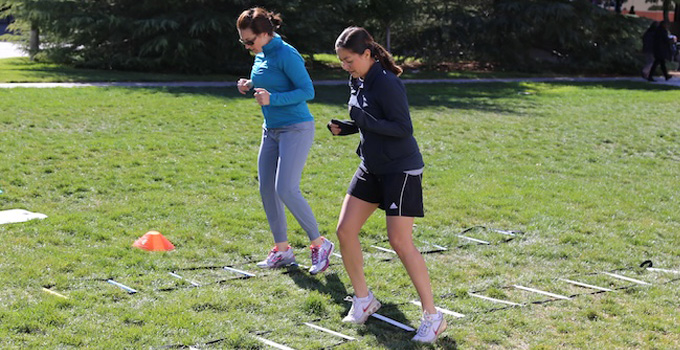New year, new you? January is a great time to set goals for the year ahead, things like exercising more, eating healthier, or maybe taking more time for yourself. They’re all good resolutions but to set yourself up for success, the focus shouldn’t be on what your goals are, but instead why you are setting them in the first place.
Jennifer Crawford, PhD, is a clinical psychologist and assistant professor in The University of New Mexico’s Psychiatry and Behavioral Sciences Department.

If we don't care about why we're doing it, then it makes it really difficult to stick with that new behavior or a new habit. And it's way easier to change things up when you know your why. What is the why?
“Sometimes we set goals because we think it’s something that someone else expects or what we should expect of ourselves,” she says. “But really, if we don't care about why we're doing it, then it makes it really difficult to stick with that new behavior or a new habit. And it's way easier to change things up when you know your why. What is the why?”
If you're hoping to make a change in 2024 for some part of your wellness, physical, emotional health, or mental well-being, Crawford says there are some specific steps you can take to make sure that your goals are a good fit for you and therefore more achievable.
What's key to goal setting is to think about what's most important to you. How does the goal connect with something you really care about deep down, or the kind of person you want to be, or the kind of life you want to have?
How do you set reasonable goals?
When it comes to setting reasonable goals, Crawford says it’s all about being SMART.
“That stands for Specific, Measurable, Attainable, Relevant, and Time bound,” Crawford says.
“What's key to goal setting is to think about what's most important to you. So how does the goal connect with something you really care about deep down, or the kind of person you want to be, or the kind of life you want to have? In that way, reasonable goals become easier to commit to.”
Crawford says setting SMART goals is a way of making sure that a goal isn't too big and therefore maybe more difficult to achieve. It helps you to define a goal in a way that makes it more reasonable.
SMART Goal Example
Maybe your goal is to move your body more this year to better manage work stress. A relevant SMART goal may be to: walk in my neighborhood for 30 mins after I get home from work, on Tuesdays and Thursdays, starting tomorrow for the next 4 weeks.
That goal Specific and Measurable: walking for 30 minutes a day.
Attainable: Tuesdays and Thursdays.
Relevant: walking will help to reduce stress.
Time Bound: starting tomorrow for 4 weeks.
How do you maintain those goals?
This is where the “why” of your goal really comes into play. Crawford says if you know your “why,” then it’s easier to keep the big picture in mind.
“For example, your goal may be to walk more often. Why is walking your goal? Is that because you really value your vitality and your mobility, and you want to keep up with your children? Is it because you really value connection; so, the morning walk you have with your partner is really important to you? Is it because you want to improve your overall health so that you can go on a big hike or a trip that you have planned?”
Crawford says thinking about why you really value something and what the long-term picture is can really help you maintain progress on your goals.
Getting started can be half the battle. What’s your advice on finding motivation?
When we think about change, we might be waiting a long time If we're waiting to feel motivated to do something differently. It can be helpful to flip that around on its head and instead think about doing differently, to feel differently.
“When we think about change, we might be waiting a long time If we're waiting to feel motivated to do something differently,” Crawford says. “It can be helpful to flip that around on its head and instead think about doing differently, to feel differently.”
She says if you’re not feeling motivated to do something, it’s helpful to think about the tiniest step you can take towards that goal today.
“Just something to give you a win,” Crawford says, “and help you build on that to the next piece of the habit you're creating, or the goal or the change you're making. So, thinking about it less like you have to achieve all of it all at once and going a little bit at a time.”
Finally, she adds, it’s important to remember that everyone struggles with new goals; it’s never too late to re-set and try again.
“Instead of feeling like a failure because you've set a New Year's resolution, go back to the basics,” Crawford says. “Is the goal reasonable? Do you need to break it down into smaller goals? Do you need to build some excitement and momentum by achieving some smaller goals in succession on the way to the larger goal?”
